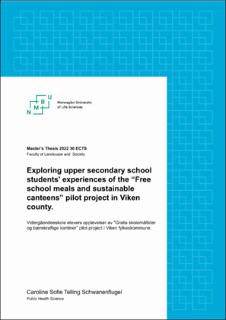| dc.contributor.advisor | Grabalov, Pavel | |
| dc.contributor.advisor | Helleve, Arnfinn | |
| dc.contributor.author | Schwanenflugel, Caroline Sofie Telling | |
| dc.coverage.spatial | Norway | en_US |
| dc.date.accessioned | 2022-11-02T10:09:54Z | |
| dc.date.available | 2022-11-02T10:09:54Z | |
| dc.date.issued | 2022 | |
| dc.identifier.uri | https://hdl.handle.net/11250/3029544 | |
| dc.description.abstract | Background: Current human diets are causing detriment to human health, the environment, and climate. Policies that support population shift towards more sustainable and healthy diets are crucial to achieve Sustainable Development Goals. Free school meals may have the potential to broadly influence dietary habits of students, from all socioeconomic backgrounds. In autumn 2020, Viken county municipality initiated a “Free school meals and sustainable canteens” pilot project in 13 upper secondary schools. The pilot project aims to gain insight to how healthy and sustainable free school meals can eventually be implemented in the rest of Viken. As the primary target group, students can offer valuable insights to current implementation and the future scaling of the initiative.
Aim: This thesis aimed to explore the experiences of upper secondary school students taking part in the Viken “Free school meals and sustainable canteen pilot project”. The thesis set out to answer three research questions relating to how the students view the free school meals and canteen food, the sustainability components, and their participation in the decision-making processes of the pilot project.
Method: The thesis used a qualitative approach whereby four focus group interviews were carried out with a total of 23 students at Ål school and Kalnes school. Data was thematically analysed by which initial codes were identified and subthemes and main themes formed.
Findings: Many students were positive to having a free meal offer, yet several found meals to deviate from their food preferences. Students had varied levels of understanding of sustainability. They recognised food sustainability as having many benefits on a societal level but did not find sustainability to be important for their own food choices. Furthermore, students experienced their participation to be low. They had little knowledge and understanding about the pilot projects aims and conditions and they experienced that their views were often not heard or taken into account in decisions. This had several repercussions on students overall view of the pilot project.
Conclusions and implications: The findings point to a need to balance healthy and sustainable meals with students' preferences. Furthermore, increasing students’ knowledge of sustainability components through connecting classroom teaching with the school meals may support the shaping of sustainable dietary behaviours. Lastly, increasing the degree of student participation in design and implementation could facilitate the successful scaling of the initiative to the rest of the schools in Viken. | en_US |
| dc.description.abstract | Baggrund: Nuværende kostvaner har negative konsekvenser for både menneskers sundhed, miljøet og klimaet. Policy der understøtter befolkningsskifte mod mere bæredygtige og sunde kostvaner, er afgørende for at nå Verdensmålene for bæredygtig udvikling. Gratis skolemåltider kan have potentialet til i vid udstrækning påvirke kostvaner hos elever fra alle socioøkonomiske baggrunde. Viken fylkeskommune igangsatte i efteråret 2020 et pilotprojekt for ”Gratis skolemåltider og bæredygtige kantiner” i 13 gymnasier. Pilotprojektet har til formål at få indsigt i hvordan sunde og bæredygtige gratis skolemåltider på sigt kan implementeres i resten af Viken. Som den primære målgruppe kan eleverne bidrage med værdifuld indsigt i den nuværende implementering og den fremtidige skalering af initiativet.
Formål: Denne studie havde til formål at udforske gymnasieelevers erfaringer med deres deltagelse i Vikens "Gratis skolemåltider og bæredygtige kantiner” pilotprojekt. Studie to for sig tre forskningsspørgsmål der omhandlet hvordan eleverne ser på de gratis skolemåltider og kantinemaden, bæredygtighedskomponenterne og deres medvirkning i pilotprojektets beslutningsprocesser.
Resultater: Mange elever var positive over for at have et gratis måltidstilbud, men flere fandt måltiderne til at afvige fra deres madpræferencer. Eleverne havde forskellige niveauer af forståelse af bæredygtighed. De anerkendte fødevarebæredygtighed som at have mange fordele på et samfundsniveau, men fandt ikke bæredygtighed vigtigt for deres egne madvalg. Desuden oplevede eleverne, at deres deltagelse var lav. De havde ringe viden om og forståelse for pilotprojektets mål og betingelser, og de oplevede, at deres synspunkter ofte ikke blev hørt eller taget i betragtning i beslutningsprocesser. Dette havde flere konsekvenser for elevernes syn på pilotprojektet.
Konklusioner og implikationer: Resultaterne peger på et behov for at balancere sunde og bæredygtige måltider med elevernes præferencer. Samtidig kan det at øge elevernes viden om bæredygtighedskomponenter ved at forbinde klasseundervisning med skolemåltiderne understøtte udformningen af bæredygtig kostadfærd. En øget grad af elev medvirkning i design og implementering ville kunne støtte en vellykket skalering af initiativet til resten af skolerne i Viken. | en_US |
| dc.language.iso | eng | en_US |
| dc.publisher | Norwegian University of Life Sciences, Ås | en_US |
| dc.rights | Attribution-NonCommercial-NoDerivatives 4.0 Internasjonal | * |
| dc.rights.uri | http://creativecommons.org/licenses/by-nc-nd/4.0/deed.no | * |
| dc.subject | School meal programs | en_US |
| dc.subject | Youth Participation | en_US |
| dc.title | Exploring upper secondary school students' experiences of the “Free school meals and sustainable canteens” pilot project in Viken county | en_US |
| dc.title.alternative | Vidergåendeeskole elevers opplevelser av ”Gratis skolemåltider og bærekraftige kantiner” pilot project i Viken fylkeskommune | en_US |
| dc.type | Master thesis | en_US |
| dc.subject.nsi | VDP::Social science: 200 | en_US |
| dc.description.localcode | M-FOL | en_US |

